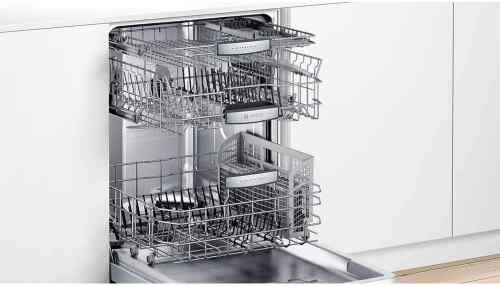If you’ve ever opened your dishwasher with anticipation, only to find your once-sparkling dishes covered in a layer of chalky residue, you’re not alone. This perplexing issue can be frustrating, especially when you’re expecting clean and pristine results. In this article, we will delve into the reasons behind this phenomenon and explore effective solutions to ensure your dishes come out gleaming and residue-free.
Table of Contents
What Does Chalky Residue Look Like?
Chalky residue on dishes appears as a white, powdery film that can be easily wiped off. It dulls the shine of glassware and cutlery, leaving a less-than-desirable appearance.
Common Culprits of Chalky Dishes
Several factors contribute to the formation of chalky residue. These include hard water deposits, improper detergent usage, clogged sprayer arms, low water temperature, and depleted salt and rinse aid levels.
Hard Water Woes
The Role of Hard Water in Dishwasher Residue
Hard water, rich in minerals like calcium and magnesium, leaves behind deposits that form chalky residue. These minerals bond with soap particles and settle on dishes during the wash cycle.
Signs of Hard Water Buildup
Look out for spots on glassware, cloudiness on dishes, and a chalky texture. If you notice these signs, hard water is likely the culprit.
Detergent Dilemmas
Inadequate Detergent Usage
Using too little detergent reduces cleaning efficiency, leading to incomplete removal of food particles and mineral deposits. Follow manufacturer recommendations for optimal detergent amounts.
Importance of Rinse Aid
Rinse aid prevents water spots and residue by aiding the drying process. It also ensures water sheets off dishes, preventing mineral buildup.
Sprayer Arm Issues
Blockages and Clogs
Clogged sprayer arms can’t distribute water effectively, resulting in uneven cleaning and residue buildup. Check and clear any obstructions regularly.
Proper Maintenance of Sprayer Arms
Ensure the sprayer arms can move freely. Remove debris and sediment that could obstruct their rotation, ensuring an even spray throughout the dishwasher.
Water Temperature Matters
Impact of Low Water Temperature
Low water temperature hinders detergent activation and proper food particle removal. It also prevents the dissolution of minerals in hard water.
Ensuring Optimal Water Heating
Check your dishwasher’s water heating element for functionality. Use hot water at the sink before starting a cycle to ensure the dishwasher begins with warm water.
Salt and Rinse Aid Depletion
Using Dishwasher Salt
Dishwasher salt regenerates the water softener and prevents mineral deposits. Regularly refill the salt reservoir following manufacturer guidelines.
Benefits of Rinse Aid
Rinse aid aids in the drying process and prevents water spots. Ensure the rinse aid compartment is full for each cycle.
Glassware and Delicate Items
Ensuring Proper Loading
Properly load glassware and delicate items to prevent water buildup and ensure they are adequately exposed to water and detergent.
Choosing the Right Cycle for Different Items
Select appropriate cycles for different types of dishes. Delicate items might require a gentler cycle, while heavily soiled dishes need a more intense cleaning.
Regular Maintenance
Cleaning the Filter
A dirty filter can recirculate debris and residue. Clean it regularly to ensure efficient water circulation.
Monthly Maintenance Routine
Implement a monthly maintenance routine involving cleaning the interior, checking for blockages, and running an empty cycle with vinegar to remove buildup.
Upgrading Your Dishwasher
Considering a Water Softener
Installing a water softener can significantly reduce hard water buildup, leading to cleaner dishes and fewer residues.
Investing in a High-Efficiency Model
High-efficiency dishwashers use less water and energy while providing better cleaning performance. Consider upgrading if your current dishwasher is outdated.
Concluding Remarks
In conclusion, a chalky residue on your dishes can be attributed to various factors such as hard water, detergent issues, and maintenance neglect. By understanding these causes and implementing the suggested solutions, you can enjoy spotless, gleaming dishes after every wash cycle.
FAQs
- Q: Can I use regular table salt in my dishwasher?
- A: No, it’s recommended to use dishwasher-specific salt as regular table salt may contain additives that can damage the appliance.
- Q: How often should I clean the dishwasher filter?
- A: Cleaning the filter once a month is advisable to prevent debris from recirculating and affecting cleaning performance.
- Q: Can I skip using rinse aid?
- A: While you can skip using rinse aid, it’s not recommended, as it helps improve drying and prevent water spots.
- Q: Why do some glasses come out cloudy even after a wash?
- A: Cloudiness on glasses often indicates hard water buildup. Using rinse aid and maintaining optimal water temperature can help mitigate this issue.
- Q: Are there any eco-friendly detergent options to prevent residue?
- A: Yes, there are eco-friendly dishwasher detergents available that are designed to reduce residue and promote cleaner results.

